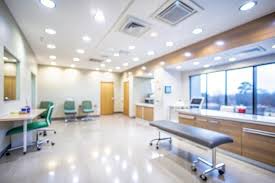In the rapidly evolving healthcare industry, Utah health clinic have a vital role to play in providing comprehensive, personalized, and accessible care to communities all over the world. These clinics provide a range of services to address a variety medical needs. They also ensure patient convenience and access.

A medical clinic typically has a diverse group of healthcare professionals working together to deliver holistic health care. This includes general practitioners, nurses and specialists. This collaborative approach to healthcare is vital in the management and treatment of acute and chronic illnesses, providing preventive health care, and promoting general well-being. Medical clinics promote lasting relationships between healthcare providers and patients by focusing on continuity of care. This is essential for effective health management.
The ability of medical clinics to offer walk-in and immediate services is one of their primary advantages. Contrary to larger hospital systems which might require long waits for appointments, clinics provide same-day consultations. This makes healthcare more accessible, especially for non-life threatening but urgent conditions. This accessibility relieves emergency departments of the burden, so that they can focus on more severe cases.
Medical clinics also serve as centers for prevention. Clinic services include health education, regular screenings, vaccinations and checkups. By focusing their efforts on prevention, clinics can help reduce the likelihood of serious health issues developing.
Medical clinics contribute to the health of communities by addressing local concerns. They customize their services in order to meet the needs of specific populations, whether it is managing common chronic diseases like hypertension and diabetes or providing specialized treatment for pediatrics or elderly patients. Clinics can adapt to new healthcare needs and remain relevant.
The technological advances have enhanced the capabilities of clinics. Integrating electronic health records, digital health tools, and telemedicine has improved diagnostic accuracy and improved communication between patients. Telemedicine in particular has increased access to healthcare, as it allows patients to consult with medical professionals remotely.
Conclusion: Medical clinics are an essential component of the healthcare industry, providing comprehensive and personalized care for diverse populations. Clinics are able to address not only immediate health issues, but also promote long-term health by focusing preventive care, ensuring continuity in care, and using technological advancements. Medical clinics, as the backbone for community healthcare, continue to evolve and adjust to the changing needs and wants of patients. They contribute to a healthier, more resilient society.
